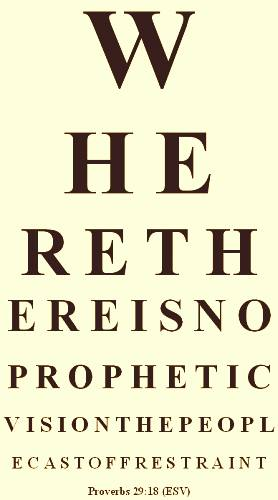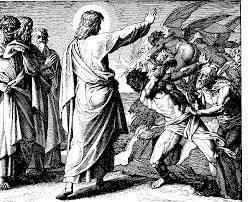𝗣𝗿𝗼𝘃𝗲𝗿𝗯𝘀 𝟮𝟵:𝟭𝟴 𝗪𝗵𝗲𝗿𝗲 𝘁𝗵𝗲𝗿𝗲 𝗶𝘀 𝗻𝗼 𝗿𝗲𝘃𝗲𝗹𝗮𝘁𝗶𝗼𝗻, 𝗽𝗲𝗼𝗽𝗹𝗲 𝗰𝗮𝘀𝘁 𝗼𝗳𝗳 𝗿𝗲𝘀𝘁𝗿𝗮𝗶𝗻𝘁; 𝗯𝘂𝘁 𝗯𝗹𝗲𝘀𝘀𝗲𝗱 𝗶𝘀 𝘁𝗵𝗲 𝗼𝗻𝗲 𝘄𝗵𝗼 𝗵𝗲𝗲𝗱𝘀 𝘄𝗶𝘀𝗱𝗼𝗺’𝘀 𝗶𝗻𝘀𝘁𝗿𝘂𝗰𝘁𝗶𝗼𝗻.
The “revelation” in this verse denotes a prophetic vision – a word from God concerning the current times and circumstances of the people. There are many instances of the Lord speaking through prophets, and it was often a word of correction or judgment, in response to sin or the ongoing obstinance of the nations. It happened in addition to the written Law of Moses. And the Law of Moses – the first 5 books of the modern Bible is what “wisdom” is in the verse (the word is “Torah” – Hebrew for Law).
Taken together, the lack of a recent, fresh prophetic word is taken by people as a signal to walk away from following God, to cast off restraint, give in to temptation or go after other pursuits. It is a dangerous proposition (as the KJV states – “the people perish”).

But blessed, or happy, is the one – now pointing to the individual – who remembers the eternal word of God and maintains restraint.
In the practice of corporate faith, there is an ongoing “vogue” of the latest thing spoken and heard. The fresh word from a prophet has a crisp feel to it; a relevance and personal, contemporary touch. There is a vibrant, vital preaching or worship ministry happening, and it captures hearts and attracts many followers. Growth may be exponential and blessing abundant and rich.
But, invariably, the season ends. The Lord ends it, if for no other reason than people start to depend upon it. As Keith Green sang – “nothing lasts except the grace of God by which I stand in Jesus”.
As a result, there can quickly develop a “what have you done for me lately?” accusation towards God. But God is not duty bound to provide a constant flow of special words for people or sustain any given movement or ministry. We have been given another, more eternal and powerful word already. That is what the blessed one has, undergirding it all.
Firstly, it is necessary test for any sermon or prophecy to align with the given Word of God. Secondly, to experience prophetic words and in-season messages and on-fire ministries should not be a source of pride; yet that can and does happen. With that pride, when the experience ceases, so do faith and obedience. Being rooted and grounded in the Word is critical at those points.
And likewise, there is no room for pride among those to heed wisdom’s instruction either, for wisdom demands humility. And there is blessing or happiness in being kept safe and in faith.








